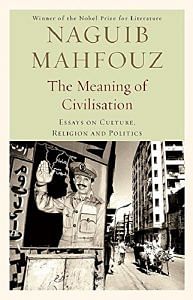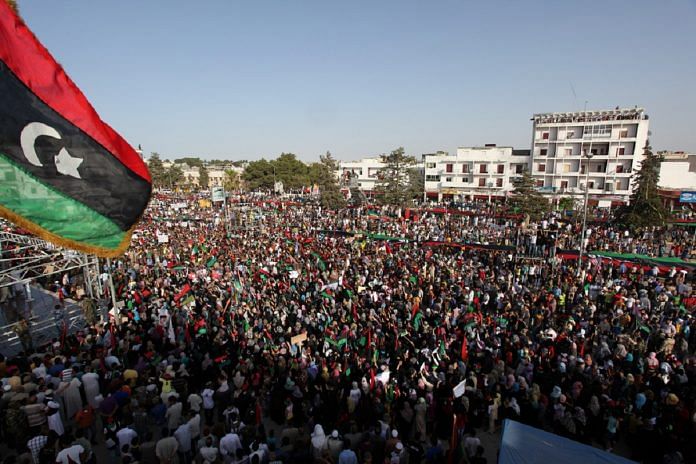The essays offer us both the portrait of a decade, and the self-portrait of one of its more important participants.
At the beginning of Palace Walk, the opening novel in Naguib Mahfouz’s famous Cairo Trilogy, Amina, a woman who has always been kept in complete seclusion by her husband, is encouraged by her children to step outdoors and make a brief visit to the shrine of her favourite saint. As she takes her first hesitating steps upon the street, she:
“turned to look at her latticed balcony. She could make out the shadows of her two daughters behind one panel. Another panel was raised to reveal the smiling faces of Fahmy and Yasin.”
In one striking image, Mahfouz – the first Arab writer to win the Nobel Prize for literature – communicates more about mid-20th century Egyptian society, with its repressive gender codes, than could be contained in a chapter of ordinary description. That, indeed, is a staple feature of his novels: whether it is the retelling of the creation myth in Children of the Alley, the deft, almost wistful, treatment of youth and immigration in Miramar, or the unsparing realism of Midaq Alley or The Cairo Trilogy, Mahfouz wrote his keen observation of contemporary Egyptian society into his novels, and seasoned it with a subtle almost imperceptible ethical scrutiny.
For this reason, the newly-published The Meaning of Civilisation: Essays on Culture, Religion and Politics, which is a collection of essays that Mahfouz wrote in the 1970s, is an important new addition to the Arab canon in translation. Not only does it record the impressions of a man who bore witness to one of the most tumultuous decades in modern Middle-Eastern history, but it also allows Mahfouz to state the convictions that he could only allude to in his fiction. The essays, therefore, offer us both the portrait of a decade, and the self-portrait of one of its more important participants.
The essays in The Meaning of Civilisation can broadly be divided into two types. The first set is a series of concrete observations on contemporary events, ranging from a critique of the Shura Council (the now-abolished Upper House of the Egyptian parliament), a comment on the foundation of a “National University”, and an enthusiastic endorsement of a Committee for National Unity. While dated, these essays are by no means irrelevant. In particular, they assume resonance because of the Egyptian Revolution of 2011, and the violent manner of its suppression. When reading Mahfouz’s criticism of sectarian violence in “Towards the Paradise of National Unity”, for example, which leads him to endorse the Committee for National Unity, we can view a foreshadowing of the anti-Muslim Brotherhood sentiment that swept the Egyptian army to power in a counter-coup, after the election of Mohammad Morsi. While the clichéd phrase “the more things change, the more they say the same” is too simplistic an explanation for the recurrence of historical phenomena, it is nonetheless fascinating to read about the issues that were engaging an activating Mahfouz’s intellect, and then ponder about the fact that four decades later, they still remain unresolved and relevant.
The second set of essays concerns themes that were particularly salient to Mahfouz’s time, but about which he writes in an abstract, almost detached – and timeless – tone. We have observations on thought, on Islam, on God more generally, on civilization and on stability, on youth, and on much more. These essays are a heady mix of historical analysis, cultural critique, and political prescription: in a piece called “Islam and the Battle of Ideologies”, for instance, Mahfouz sets himself the task of briefly tracing the history of Islam and asking why it has proven to be such a durable and popular religion.
If, however, Mahfouz’s fiction brings you here expecting to find a radical critique of the existing social and political arrangements – an Egyptian Edward Said, for example – then this second set of essays may be something of a disappointment. What they reveal is not so much an implacable critic, as they do a somewhat conservative individual, who finds enough parts of the governing apparatus disconcertingly palatable. In an essay on freedom of art and censorship, for example, Mahfouz draws a distinction between bad censorship (intolerable) and good censorship, which is only designed to assure that the public doesn’t have access to irrelevant works. As history has revealed time and again, this is a distinction without a difference; and Mahfouz’s uncritical exposition, as well as his support in other places for the more unsavoury aspects of Nasser’s regime, strike a severely discordant note from the truly radical edge of his novels.
Novels, of course, offer far greater refuge than avowedly non-fiction, public writing. It might be fairly assumed that at least some of the time, Mahfouz was writing strategically. This reconciliation, while unsatisfactory, is certainly a better prospect than imagining Mahfouz – the public writer par excellence – finding himself more on the side of the State than on any other side. For all that disappointment, however, The Meaning of Civilisation is an important account of a time that seems more on the cusp of repeating itself, than passing on into history. Naguib Mahfouz is and will remain one of the foremost chroniclers of that time.
Gautam Bhatia is a Supreme Court lawyer.‘The Meaning of Civilisation: Essays on Culture, Religion and Politics by Naguib Mahfouz’ has been published by Speaking Tiger.







